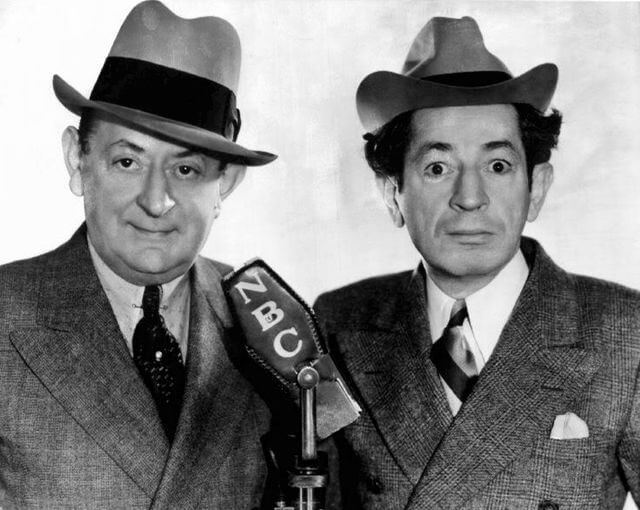Why a 92-year-old Jewish vaudeville routine is inspiring a new trend on Twitter
‘Pay the $8’ is trending, and it sounds familiar for a reason

Eugene and Willie Howard in 1936. Photo by Wikimedia Commons
In the aftermath of Thursday’s purge of authenticated blue checks on Twitter comes a familiar refrain for those who know their Jewish comedy and adjust it for inflation: “Pay the $8.”
The argument, being made by those who’ve shelled out for a monthly fee for Twitter verification, is that the $8 sum is negligible, not worth fighting for the added prestige or security that comes with a blue tick by your name on one of the world’s largest forums. Some argue that Twitter is a utility worth paying for, while others claim that opening verification up to anyone with money has made it essentially meaningless — or even a form of extortion for a doomed platform.
It’s all very 2023 — by way of 1931.
One can’t help recalling the vaudeville sketch “Pay the Two Dollars,” devised by Jewish brothers Willie and Eugene Howard. Reprised in the 1945 film Ziegfeld Follies, the sketch involves a man served with a $2 fine for “expectorating” on the subway, and his lawyer’s hard-nosed refusals to pay the sum, culminating in the spitter’s arrest, conviction and, ultimately, death sentence.
Over the decades, “pay the $2” has become a shorthand for not standing too much on principle when you could simply part with a small sum. Fittingly it has had some staying power as a legal axiom. On one occasion, it was deployed against Mel Brooks, who was fined the famous sum for leaving out a garbage pail in Ocean Beach on Fire Island.
While the advice is practical when measured against arrest, failing to pay $8 (really $96 annually) to the world’s richest man would appear to incur a lesser penalty. While The New York Times, Dan Rather and countless other notable accounts now lack the blue badge of “I paid for this,” you’d be in good company.
You could pay the $8. Or you could save your money. The choice is yours, and whatever your decision, it probably won’t land you in Twitter jail.
A message from our CEO & publisher Rachel Fishman Feddersen
I hope you appreciated this article. Before you go, I’d like to ask you to please support the Forward’s award-winning, nonprofit journalism during this critical time.
We’ve set a goal to raise $260,000 by December 31. That’s an ambitious goal, but one that will give us the resources we need to invest in the high quality news, opinion, analysis and cultural coverage that isn’t available anywhere else.
If you feel inspired to make an impact, now is the time to give something back. Join us as a member at your most generous level.
— Rachel Fishman Feddersen, Publisher and CEO